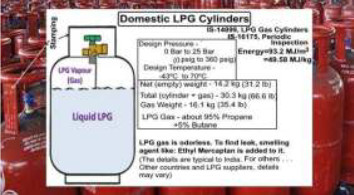As this magazine would find its place in the hands of mariners their families and other readers so I thought of writing my article in a very simplified manner. My article is on LPG and use in daily life. In India LPG is approximately 48% of propane 50% of butane and 2% of pentane. We all have been using LPG since long but less we are aware of facts related to it. Liquefied Petroleum Gas (LPG) is a versatile energy source widely used for various purposes around the world. From cooking to heating, LPG serves as a convenient and efficient fuel. However, understanding its uses and taking necessary precautions are crucial and important to ensure safety.
Uses of LPG:
- Cooking: LPG is commonly used as a cooking fuel in households globally. Its clean combustion and controllable flame make it ideal for cooking various dishes.
- Heating: LPG is used for space heating in homes, businesses, and industries. It provides quick and efficient heat, making it popular in colder regions.
- Hot Water Systems: Many water heaters are powered by LPG, offering a continuous supply of hot water for domestic and commercial purposes.
- Transportation: LPG is used as an automotive fuel in vehicles such as taxis, buses, and forklifts. It’s an eco-friendly alternative to traditional gasoline and diesel.
- Industrial Applications: LPG serves as a fuel for various industrial processes such as metal cutting, soldering, and glass manufacturing due to its high energy content and clean combustion.
Precautions Related to LPG:
- Proper Ventilation: Ensure adequate ventilation in areas where LPG is used to prevent the buildup of gas, which can lead to asphyxiation or explosion.
- Regular Maintenance: Regularly inspect and maintain LPG appliances, including stoves, heaters, and cylinders, to prevent leaks or malfunctions. The cylinders are always pressure tested from time to time so next time you get your cylinder do not forget to check the pressure test due date. Some people confuse this date as expiry date of gas which is not the case.
- Storage Safety: Store LPG cylinders in a well- ventilated area away from direct sunlight, heat sources, and flammable materials. Cylinders should be stored upright and secured to prevent accidents.
- No Smoking: Smoking near LPG appliances or cylinders is extremely dangerous and should be strictly prohibited.
- Emergency Preparedness: Keep the fire extinguisher, gas leak detector, and emergency contact numbers handy in case of any accidents or leaks.
- Proper Installation: LPG appliances should be installed by certified professionals to ensure safe operation and compliance with local
regulations. - Avoiding DIY Repairs: Never attempt to repair LPG appliances or cylinders yourself. Contact a qualified technician for any maintenance or repairs. Never attempt to modify or repair valves, regulators or other parts by yourself until you are trained to do so.
- Educate Users: Ensure that everyone in the household or workplace is aware of the potential hazards associated with LPG and knows how to respond in case of emergencies.

Conclusion:
LPG is a valuable energy source with a wide range of uses, but it requires careful handling and adherence to safety precautions. By understanding its uses and taking necessary precautions, we can enjoy the benefits of LPG while minimizing the risks associated with its
use.
Atul Chaudhary
2″ Engineer LNG (MOL)